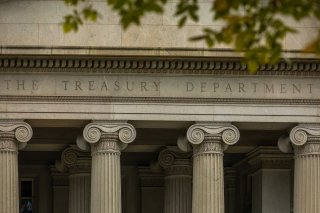New Outbound Investment Rules Can Help Strengthen American Economic Security
If policymakers commit to enforcement and meaningful communication, outbound investment rules could help facilitate a global realignment of capital that benefits all those countries committed to playing fair.
A new weapon has just been added to America’s economic statecraft arsenal—one that has the potential to realign Western capital flows in ways that support U.S. national and economic security, at home and abroad. In an August 9 executive order (EO), the Biden administration imposed new rules on outbound investments in three critical industries—semiconductors, quantum computing, and artificial intelligence—to prevent “countries of concern” from turning U.S. technology against its creators.
The new EO lists a single country of concern (China) but the designation could be extended to a host of other adversarial nations. The Treasury Department will still need to draft regulations based on the order. In addition, multiple bills have been introduced in Congress to address problematic outbound investments that weaken American security. Interestingly, even the currently narrow EO lays out a framework that could later be expanded to address the risks posed by new industries or countries that, as the EO states, support our adversaries’ “military, intelligence, surveillance, or cyber-enabled capabilities.”
The limited focus of the new EO may obscure what it truly represents for global markets: Washington’s recognition that outbound capital flows are strategic extensions of national power—whether used to build foreign industry or, in China’s case, funding dual-use technology and research with known military applications. While America has long relied on inbound investment screening, sanctions, import restrictions, and export controls to constrain the malign or disruptive behavior of foreign adversaries, outbound investment restrictions have the potential to evolve into a more potent economic tool.
Outbound investment rules can limit the flow of capital to worrying sectors of a foreign economy and significantly constrain the funding that otherwise might be keeping adversarial industries afloat. Most importantly, it sends a critical message to the private sector to carefully examine geopolitical risks when investing in foreign regimes.
Outbound investment rules could also help America, its allies, and the powerful engines of private Western capital work in greater alignment to support democratic and economic guardrails. Like Russia’s invasion of Ukraine, China’s belligerence towards Taiwan threatens our globally integrated world economy.
Outbound investment restrictions could evolve into a critical new tool to curb our adversaries’ weaponization of technologies that disrupt America’s economic and national security, by handicapping key industries that adversaries use to wage war, promote authoritarianism, or build surveillance states that oppress their citizens. While outbound capital restrictions will not necessarily prevent the domestic support of those industries—China will undoubtedly still continue to fund domestic AI industries—it does keep Western capital from inadvertently furthering investments counter to U.S. and allied interests in highly critical areas. Given the size and power of the Western private sector, that is an ambitious objective.
Like any weapon, economic or ballistic, risks are inherent to its deployment: unintended consequences, collateral injuries, and the temptation to overuse. If poorly implemented, outbound investment screening can obstruct or burden legitimate investments and could easily harm U.S. investors who would face competitive disadvantages against overseas rivals. Further, U.S. companies with legitimate and productive investments in countries like China could face unwarranted retaliation.
Despite that, outbound investment screening has tremendous promise—in large part derived from its ability to harness the power of the U.S. financial sector and highlight the long-term market risks that derive from propping up dangerous regimes. While this might have once seemed heavy-handed, the private sector risk appetite is shifting. After Russia’s invasion of Ukraine, private multinationals pulled out of Russia in record numbers, taking losses and closing off markets that they had worked hard to establish. As tensions have risen with China, in parallel with China’s self-inflicting government actions against industry, the United States and global private sectors have not waited for a possible invasion of Taiwan to act. Even without any outbound investment restrictions in place, foreign investment in China has nosedived. Indeed, Chinese officials who used to come back from foreign trips with briefcases full of private sector agreements to invest in the country are now coming back empty-handed.
With the private sector paying close attention to geopolitical risk and rising divisions between those who support the global order and those countries seeking to supplant it, the timing is excellent for the US and its allies to help drive the alignment forward, helping to support the rules of the road by which all nations can prosper.
To truly succeed, outbound investment regulations drafted based on this EO will need to pay attention to two critical dynamics:
First, any regulations must be clearly defined and combined with an enforcement framework that is robust and palatable to private companies seeking to make legitimate investments in higher-risk countries.
Second, regulators must launch an open and frank ongoing dialogue with investors (with similar dialogues between the United States and its allies), as we seek to collectively reimagine how private investment can and should support our shared national and economic security.
If policymakers commit to enforcement and meaningful communication, outbound investment rules could help facilitate a global realignment of capital that benefits all those countries committed to playing fair.
Elaine Dezenski is senior director and head of the Center on Economic and Financial Power at the Foundation for Defense of Democracies.
Image: Shutterstock.

